Part 41: Fixing TLA: Part 2
How To Make Golden Sun Less Terrible: TLA Edition: Part 2It's been a veritable lost age (ho ho!) since the last one of these, so here's a quick recap of what's changed: Felix is determined to light the lighthouses but the others have a few misgivings, and they openly decide to make it a low priority and immediately focus on meeting up with Alex instead. When they do, Alex blows them off but mentions that he's going to Madra/Alhafra to look for a replacement ship, and you decide that trying to do something similar is a good next step regardless of if you end up lighting the lighthouses or not. So...
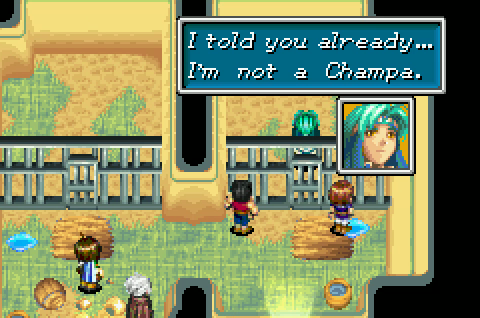
When we run into him in Madra, Piers directly tells us about his connection with alchemy. We notice his ice column creation skills and have a brief talk through the bars, where he name-drops Lemuria and Kraden & Sheba find their interests piqued. Piers mentions that he came here on a mission but was framed for a crime, and he specifically asks us to help him. Why would we do that? Simple: He has a ship a town over, and he's more than willing to give us a ride in exchange for being able to return home. Basically, take the conversation we have in Kibombo and move it here; that way we actually have some reason to care about the twenty chapters of boat maintenance and an incentive to keep track of what Piers is up to.
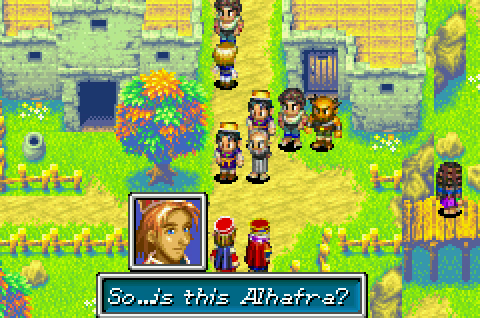
Axe the pointless drama with the mayors, since it amounts to absolutely nothing and makes no sense at all. This is a one-man mission; the Alhafra mayor simply has no idea who Briggs is and thus doesn't have any reason to suspect him.
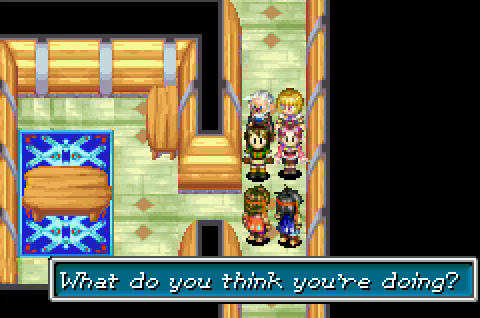
Instead of the ridiculous clusterfuck we ended up getting, the Briggs subplot can be simplified and made actually relevant by having his boat be Piers' boat. This solves almost every problem the pirate nonsense has; Briggs framed Piers because he needed his ship (Briggs' was destroyed in the Tidal Wave, but Piers' largely survived because of Lemurian magic or something), but he's increasingly on edge because he can't figure out how to get the ship to move and as a result is fine throwing up his arms and just admitting Piers was framed when he gets beaten up. After a bit of vigilante justice, he gets hauled to Madra and exchanged for Piers, who decides to tag along with you. Unfortunately, during this time Madra was ransacked, and the black orb (which was in, essentially, police custody as the mayors had no idea what it was) was among the many things stolen.
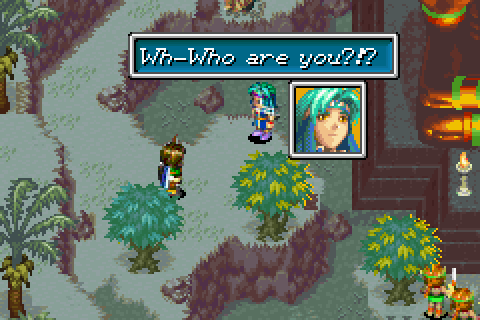
By now, the game actually opens up a bit. Piers looks at his slightly-wrecked boat and realizes that two things need to happen: It needs to be repaired, which will require a few types of psynergy, and you need to get back the orb. If the game is clear about what each step in the process is and is lenient about letting you explore things in different orders (maybe suggesting one by scaling difficulty, but omitting blatant roadblocks), you now have a series of sub-goals and an overall objective. You still have to tackle Air's Rock, Kibombo, etc, but giving you some control and tying them into something bigger makes the vignette structure actually work.
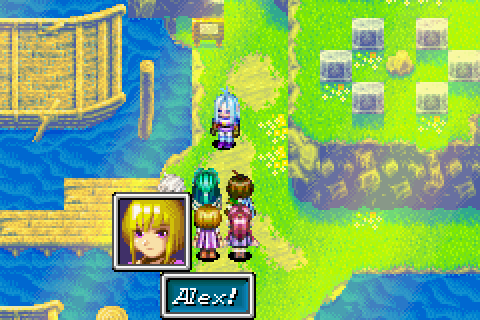
Right around this point, probably as soon as you've obtained the first psynergy or first arrived in Kibombo, you can run into Alex for the third time (he was also present in Alhafra, but he was very unhelpful, like in the current incarnation). The scene that would have otherwise occurred in Champa appears here, where Alex finally says he's had enough of your antics and you had better get to lighting those lighthouses right away. This is Piers' first exposure to the conflict, and more of the first game is recapped as your characters fill him in on what's happened. Even though you're tempted to agree with Alex, his methods seem way to extreme for him to have benevolent motives. You half-lie and say that you're currently constructing a boat explicitly to go to Jupiter Lighthouse ASAP, but the meeting only raises more concerns about what course of action you should be taking. Piers chimes in to mention that he's heard something about these lighthouses, and he thinks it has something to do with why he was sent out. Rather than the current possibilities of lighting the lighthouses or going home, Piers suggests a third option: Lemuria. If we go there, he says, we might be able to find our answer.
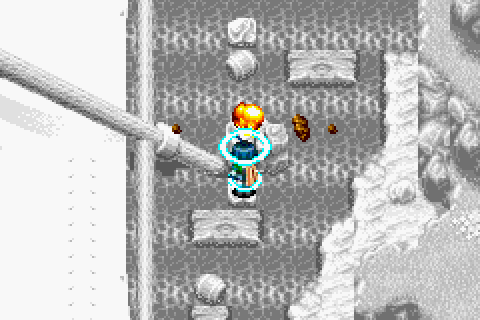
A series of vignettes later (all of which can stay, though they need to be vastly shortened, stop pretending that we're solving problems, and have 90% of the psynergy references forcibly excised), we can go back to Alhafra and get on the ship. Lemuria is open immediately, and Piers knows the trick to navigating the waters, though the rest of the world is open if we want to do sidequests. Poseidon and the trident collecting isn't gone, but it's moved; the path to Lemuria is immediate and largely painless.
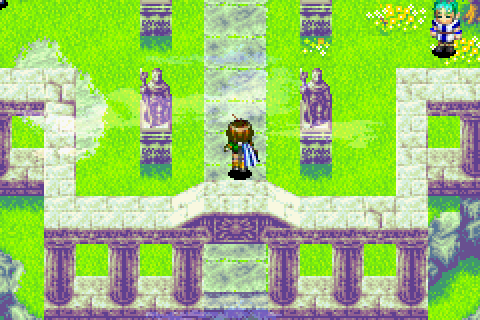
Lemuria is an absolute mess, not the boring display of mediocrity is is now. Rather than hyping it up and then failing to deliver, make it so that Kraden and Sheba (the latter of whom has heard stories through Babi) are ecstatic while Piers tries to calm their enthusiasm, and Kraden's reaction to seeing the city is a disappointed "Oh…". Piers can remember that, as a kid, the city was infinitely more grand, but people grew so dependent on alchemy to build and maintain their structures that without it nobody knows what to do (which is fairly believable; how many modern engineers do you suppose could build a ziggurat with two-millennium-old technology?) People are also becoming far more vulnerable to diseases and natural disasters, hence the flooded sections and overgrowth where they once would have completely controlled the forces of nature.
The debate between Conservato and Hydros isn't about whether or not Lemuria is decaying, which is obvious, but whether alchemy is, on balance, a good thing. Conservato makes the point (with credit to Patter Song) that the societal decay without alchemy is better than the constant feuding and power struggles with it, but Piers' findings shift the debate. The map comparison test, complete with Piers' testimony that the new map is more accurate (for bonus points, Conservato himself sailed the world 500 years ago and can confirm the old one), makes Conservato completely shift gears and start demanding that these lighthouses get lit immediately. Introducing a contrarian "villain" so he can muddle an issue and then get forgotten about is pointless, but introducing him to show that even an extremist realizes how desperate things are hugely enhances the credibility of the argument, has a much greater impact to a player who's been flying blind, and motivates us to get moving right away.
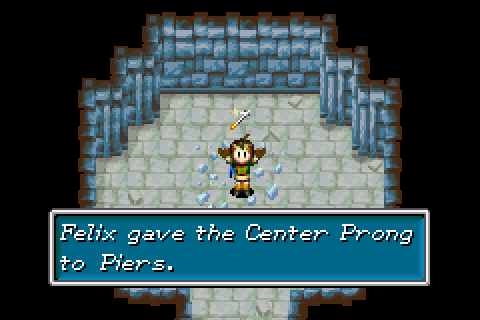
Poseidon guards the narrow passage to the Western Hemisphere, so we now have to grab the trident pieces and get them forged through Sunshine, not through Champa (the Briggs subplot ends with him in jail; there's absolutely no point in tacking on the Champa addendum when the trident forging can be done much more sensibly somewhere else). Hydros gives us hints or outright marks the locations on our map, and fast travel is implemented from the get-go so that hitting a dead end is only mildly inconvenient. When we get the pieces, Poseidon is vanquished, the West opens up, and we're on a fast track to the Jupiter Lighthouse (Piers has stuck around because he's realized that his powers will definitely be of some use and he realizes how desperate the situation is). It also couldn't hurt to have another Karst and Agatio encounter somewhere around here just to remind us of an actual conflict: Alex is growing increasingly frustrated and is this close to knocking us off and stealing the star for himself, plus we still doubt if he's lighting the lighthouses for the right reasons. In fact, Alex seems to hint that he's mostly looking forward to the power and immortality that alchemy will bring. By this point there's no confusion over what we need to do, but we're not exactly willing to do it on Alex's terms.
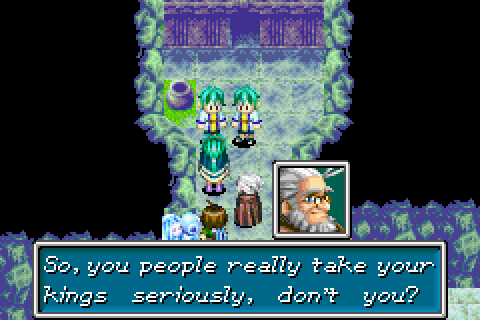
Of course, all of this neglects what I feel would be the absolute most beneficial change, which is to have Kraden die in a tragic elocution accident five seconds into the game, motivating your characters on a quest for karmic revenge, clearing up numerous issues with his incomprehensible backstory, and reducing the overall word count of the game by one-third.